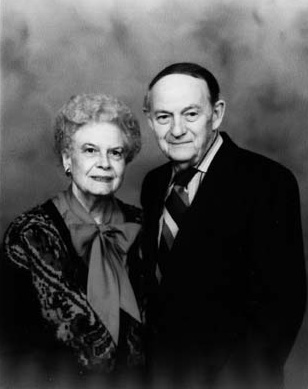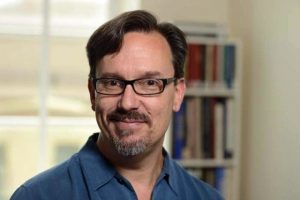 WILLIAM EVERETT LAND, A&S 1928, 1933 (PhD), had a long and successful career as a chemist and chemical engineer. He worked primarily with the U.S. Navy, where he was director of explosives research and development and served as chairman of the Ammunition and High Explosives Panel.
WILLIAM EVERETT LAND, A&S 1928, 1933 (PhD), had a long and successful career as a chemist and chemical engineer. He worked primarily with the U.S. Navy, where he was director of explosives research and development and served as chairman of the Ammunition and High Explosives Panel.
Dr. Land, who died in 2002, and his wife, ARNELL LEWIS LAND, were avid supporters of the arts. In addition to this professorship, the Lands also supported scholarships that benefit undergraduate students at the Peabody Conservatory, in the Department of Chemistry at the Krieger School of Arts and Sciences, and in chemical engineering at the Whiting School of Engineering.
Held by Mitchell B. Merback
 Trained as an art historian at the University of Chicago (PhD 1995), MITCHELL MERBACK’s first book, The Thief, the Cross, and the Wheel: Pain and the Spectacle of Punishment in Medieval and Renaissance Europe (1999), focused on late medieval Crucifixion imagery and its connection to the history of capital punishment and torture. His second book, Pilgrimage and Pogrom: Violence, Memory and Visual Culture at the Host-Miracle Shrines of Germany and Austria (2013), analyzed the role played by anti-Jewish myths, accusations, and persecutions in the formation of pilgrimage shrines before the Reformation. Another contribution to understanding art’s role in the Christian-Jewish encounter is a volume he edited, Beyond the Yellow Badge: Anti-Judaism and Antisemitism in Medieval and Early Modern Visual Culture (2008).
Trained as an art historian at the University of Chicago (PhD 1995), MITCHELL MERBACK’s first book, The Thief, the Cross, and the Wheel: Pain and the Spectacle of Punishment in Medieval and Renaissance Europe (1999), focused on late medieval Crucifixion imagery and its connection to the history of capital punishment and torture. His second book, Pilgrimage and Pogrom: Violence, Memory and Visual Culture at the Host-Miracle Shrines of Germany and Austria (2013), analyzed the role played by anti-Jewish myths, accusations, and persecutions in the formation of pilgrimage shrines before the Reformation. Another contribution to understanding art’s role in the Christian-Jewish encounter is a volume he edited, Beyond the Yellow Badge: Anti-Judaism and Antisemitism in Medieval and Early Modern Visual Culture (2008).
His third book, Perfection’s Therapy: An Essay on Albrecht Dürer’s Melencolia I (Zone Books, 2017) reopened the casebook on art history’s most famous image of creativity in paralysis. Working with the notion that there really is no “Dürer Code” to decipher, the book recuperates an overlooked therapeutic potential for images that perplex, challenge, and exercise the mind.
In his current project, Recognitions: The Poetics of Tragic Witness in Northern European Art and Drama, 1250-1550, Merback investigates the poetics of disclosure and the construction of attention in late medieval and Early Modern culture; this work was supported in 2016-17 by a fellowship from the Guggenheim Foundation.
 WILLIAM EVERETT LAND, A&S 1928, 1933 (PhD), had a long and successful career as a chemist and chemical engineer. He worked primarily with the U.S. Navy, where he was director of explosives research and development and served as chairman of the Ammunition and High Explosives Panel.
WILLIAM EVERETT LAND, A&S 1928, 1933 (PhD), had a long and successful career as a chemist and chemical engineer. He worked primarily with the U.S. Navy, where he was director of explosives research and development and served as chairman of the Ammunition and High Explosives Panel.